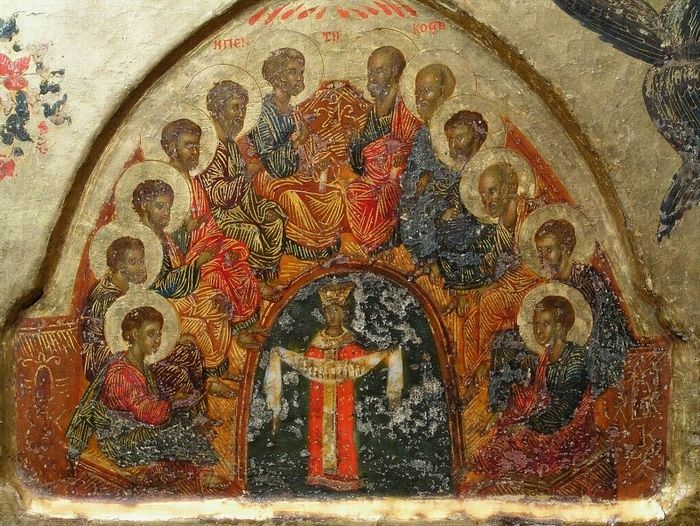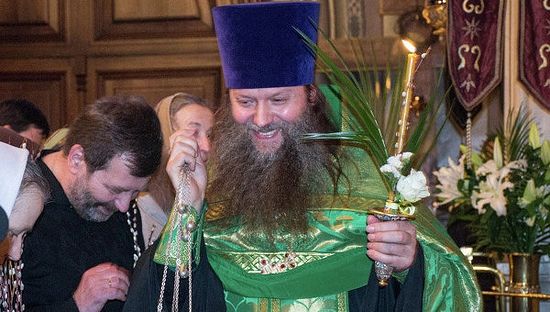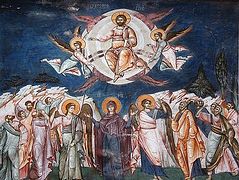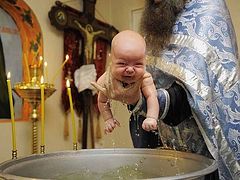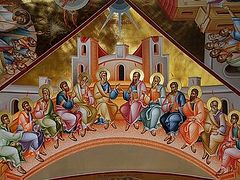Archpriest Artemy Vladimirov speaks on the spiritual and earthly aspects of the feast of Pentecost and on what each of must do and remember on this day.
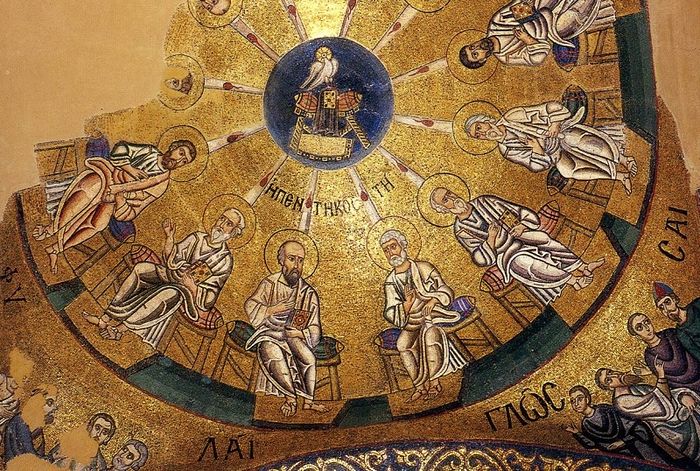 Pentecost. Mosaic arch. Fragment. St. Luke, Greece. XII century
Pentecost. Mosaic arch. Fragment. St. Luke, Greece. XII century
In just three words is found the whole essence of our salvation: Christ is Risen!
We have made it, dear friends, to the great feast of the Holy, Catholic, and Apostolic Orthodox Church—the feast of the New Testament Pentecost.
The New Testament has revealed itself in the Resurrection of Christ the Redeemer, His rising from the tomb, and Pentecost is fifty days from the Paschal night. This fiftieth day is called the day of the Consubstantial, Life-Giving, and Undivided Trinity.
In Russia the feast of the Holy Trinity—the New Testament Pentecost—usually comes in early summer, when the sun is already shining in full force, and the foliage oh so timidly pushing through the spring, gathering sap, delights the eye with greenery. The air is suffused with flowery aromas, everywhere is poured out that goodness about which poets and songwriters, known to all, composed words known to all: “This Russian expanse, this is my Homeland.”[1]
The feast of the Holy Trinity warms the heart and illumines the mind. We await it with great impatience after Pascha—our peasants, and bourgeois, and nobility—all strata of society, because Holy Trinity day proposes the abolition of earthly labors and the hustle and bustle. People dressed in festive white clothing make haste, beginning with the Vigil in the churches of God, to purge well their conscience in confession, to partake, God-willing, of the Holy and Life-Giving Mysteries of Christ, and after the Divine Liturgy to fall to their knees at the Great Vespers. It is quite an extraordinary sight, you will agree, when the church is carpeted with fragrant hay or freshly-cut grass, here and there are seen roses, chamomile, and cornflower, depending on one’s taste for ornamenting the temple of God, and the people, having bent their knees, with bated breath, as one man with reverence and awe listen to the prayers which ascend up glory on behalf of the fullness of the Church from the lips of the priest to the Tri-Hypostatic Godhead; to the God Who sees and hears, loves and reveals Himself to us in the inconspicuous, eternal, all-holy Father’s having sent God the Only-Begotten Son into the world in the flesh, Who ascends in the flesh upon the Cross and rises from the dead … Who, ascending to the habitations of the Father, sends down to us the Holy Spirit, often portrayed in the form of a dove, such as St. John the Baptist beheld Him. We see bowed shoulders and heads, but wide open immortal human souls, hungering and thirsting for the dew of the Holy Spirit, Who descends in the Divine Liturgy on the feast of the Holy Trinity, and Who overshadows those praying at the Vespers with an ineffable exhalation, a light blowing of a quiet wind, barely audible. The grace of the Holy Spirit manifests itself in pure, humble, and meek, souls of Orthodox Christians, full of brotherly love.
The feast of the Holy Trinity itself crowns the redemptive work of our Savior. For what did Christ come into the world? In order to send down upon us—the Lord Himself, to His New Testament Church, the unity of faith to His Apostles—the dew-bearing, light-bearing, vivifying, salvific grace of the Holy Spirit—that same grace which once soared over the earth formless and void; that same grace which vested Adam in glorious miraculous clothing, but which immediately flew away from the first-created couple, having only just encroached to reach out a hand to the forbidden fruit to taste it. This grace, like a dove, again descends thanks to the redeeming blood of Jesus Christ and His rising from the dead to the soul of man. Our souls resemble the earth, depleted of rainwater, cracked under the heat of temptation. As warm summer rain moistens the fields and meadows, giving a creative impulse of power to the earth to again bring forth out of itself herbs and flowers, so the grace of the Holy Spirit overshadows us on the day of the Holy Trinity, manifesting itself in smiles, serene eyes, in the sparks that emanate from someone’s eyes, in words full of truth, in mercy, and in love, and in such a special vigor and joy, peculiar to Orthodox people and our Russian people, able to labor and pray and gloriously rest.
We note, dear friends, that the feast of the Holy Trinity is especially significant. This we can deduce looking at the icon often emblazoned in churches in the week of the Holy Trinity—the icon of the Descent of the Holy Spirit upon the Apostles. What do we see in its lower margin? Some elder, adorned with a crown, as if holding a veil in his hands. Who is it? King David? No. One of the earthly lords of New Testament times—Tsar Justinian? Also no. It is the cosmos, that is, the universe. Heaven and earth, stars, sun and moon, scattered mountain ranges, the Mariana Trench, seas and oceans … the totality of God’s visible creation. But why on the icon of Holy Pentecost—the Descent of the Holy Spirit—is the cosmos depicted in a luminous golden crown? Of course, as a sign of the regeneration of all of nature by the life-giving energy of the Holy Spirit.
Leaving the temple into the world of God on the feast of the Holy Trinity, glancing about, we marvel at this fullness of the chalice of creation. In the daytime the “heavenly clouds, the eternal wanderers” delight our gaze: southwards in a chain they fly somewhere at the behest of God. The foliage rivets our attention, which together with the heart of man flutters with joy at the touch of the wind, and creation exults by night. When people rest in the night-time hours, the stars appear and glisten on the black velvet of the heavens. A breeze wafts from the sea. “Alone I set out on the road; The flinty path is sparkling in the mist”… How good it is to the sensitive believing soul on the feast of the Holy Trinity to hearken and listen, as “star with star converses.”[2] And in the expression of the Psalmist, Day unto day poureth forth speech, and night unto night proclaimeth knowledge (Ps. 19:2).
We note that our people have not overlooked in word the feast of the Holy Trinity, mysterious and inscrutable, which cannot be contained within the coconut of the human mind, but is fully grasped by the heart sensible and prophetic, penetrated and softened by faith. “God loves a Trinity”—have you ever heard such an innocent folk expression? What does it indicate? It seems to me that everything in the visible and invisible world is riddled through with the number three, as a code. To me, as a teacher of Russian, it is still surprising that many grammatical categories, for example person: first person—I; second person—you; third person—he, as if hint to us the pre-eternal existence of the Father, Son and the Holy Spirit—Persons alike in sovereignty, glory, and Divinity. You will see in nature—“Nature is not as you imagine her: She's not a mold, nor yet a soulless mask…”[3]—and you marvel how the element of water reveals itself in three manifestations: the expanse of rivers and seas, damp fog rising to heaven in the early morning, or wintertime’s icy kingdom.
Let’s examine ourselves: we also are tri-partite—spirit; free and reasonable soul with which’s highest constituent of the spirit we seek the Lord; and the body—this ark, this body in which is found the soul, inscrutably articulating the invisible by the visible, weightless with a stout composition. And indeed everywhere and all throughout the Holy Trinity has left the stamp of beauty, expediency, and reason. “Pray to the Trinity and all will be arranged,” as our people have learned from olden times. “Pray to the Trinity and all will arranged,” as from olden times our people have expressed unwavering faith in the Providence of the unified Father and Son and Holy Spirit.
We, dear friends, participating in this feast, will not forget that the feast of the Holy Trinity, crowning the redemptive podvig of Jesus Christ, speaks to us of the purpose of Christian life. We are at our core a vessel, some mysterious chalice, into which the energy of the Holy Spirit this day descends, pouring out, and filling the reservoir of the heart. The acquisition and gathering of the sparks and particles of Divine grace is the enduring, eternal destiny and mission of man. And as long as you don’t comprehend your earthly existence under the sign of eternity, as long as upon your intelligent nature is not imprinted the Father, Son and Holy Spirit, as long as you fill your heart with every kind of rubbish and surrogate, you will grievously suffer in anguish. And you will recall the reluctantly famous lines of Tyutchev: “Upon the empty fields there pours the azure glow.”[4] The field is our heart, and azure the grace of God.
On the day of the Holy Trinity you inevitably begin to ponder by what paths and means you can more conveniently fill up the heart’s lamp with the oil of the Holy Spirit. To this question best of all, perhaps, for us answers Venerable Seraphim of Sarov—a bright sun in Russian Church history: every Lent, every supplication, every good deed committed according to natural inclination to pity, help, and comfort by word are but means to acquiring, gathering, and finding within the soul the main thing, the treasure inseparable from us—the grace of the Holy Spirit, the spark of Whom first shone forth in our minds on the day of our own Baptism.
Dear friends, if you fear remaining barren on this feast of the Holy Trinity, if you fear the thought that in the time of this joy despondency and melancholy will fill your conscience as with lead, immediately resort to the ecclesiastical surgeon. Confess frankly, not hiding especially those sins which are shameful and primarily destroy the heart’s peace. Proceed, as rhetorical infants, to the Holy Chalice—the Chalice mysteriously depicted in the icon of the Old Testament Trinity by the brush of Venerable Andrei of Radonezh (Rublev). Partaking of the All-Pure Body and Blood of our Redeemer, we become vessels of the Holy Spirit, the spirit of wisdom and understanding, counsel and might, knowledge and piety and fear of God.
We await you in the temples of the Lord, in every church of our Russian Orthodoxy, from the port of Nakhodka to Brest and Kaliningrad. May the Lord grant that this celebration would echo joy, peace and love in our hearts and in our homes.

